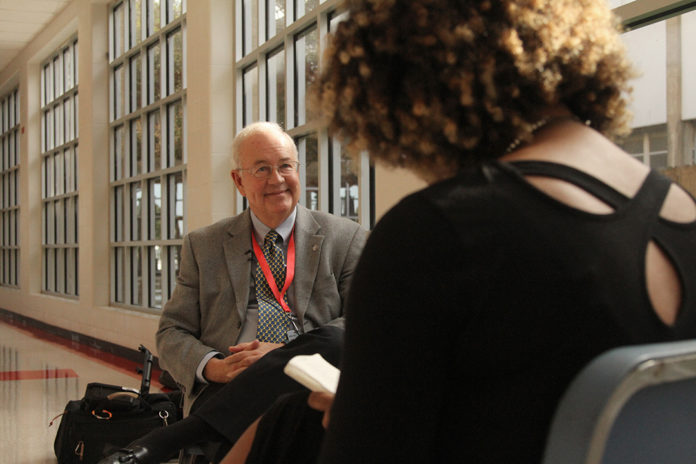
Former Baylor President and Chancellor Ken Starr intertwines the history of Baylor with his own time serving as the university’s president from 2009 to 2015 in his new book “Bear Country: The Baylor Story,” in thumb-twiddling monologue for three-fourths of the book that leaves you wondering how many pages are left until the “exploding” end.
If you love Baylor or Starr, you can find an appreciation for this book. At times, it feels as if you are reading a well-written online description on a Baylor website about traditions and school history. You desperately want to flip to the end to get the inside perspective on the scandal that made Starr’s name the memorable one it is now. But you wait, satisfied with the pointed and deliberate jabs at the Baylor Board of Regents that Starr reflects on as being a relationship filled with discord from the beginning.
“My own time had come and gone, but the longstanding desire of the regents’ leadership had been achieved,” Starr wrote. “I would no longer serve as president of a great institution. But life marches on and so does that good old Baylor Line.”
Starr wrote that he was first charmed by Baylor’s rich history and had a desire to preserve the soul of the university.
“For my part, I was now committed emotionally to the Baylor Project, but the leadership of Baylor’s Board of Regents wasn’t committed to me,” Starr wrote.
Starr works to push his love for Baylor into sentences that are packed and overexerted. However, the book creates an essence that anyone in “Bear Country” is a part of a something greater than just the school you go to or work for. Starr chronicles the rich history of Baylor as if he is building Pat Neff Hall from the ground up from the university’s beginning until the end of his time at the school.
“Baylor loves its students,” Starr wrote. “I love the students. We want them to not only to be safe but to flourish.”
Starr described intercollegiate athletics by equating them to Aldous Huxley’s ominous “Brave New World.” In his third chapter titled ‘Rookie,’ Starr wrote about how football is king and that an on-campus football stadium was a need for the program as said by former coach Art Briles.
“Little did I suspect that Coach Briles would bring unprecedented success to Baylor football, winning two Big 12 championships, recruiting future Heisman Trophy winner Robert Griffin III, and building a top-ten program,” Starr wrote. “Ultimately, however, he along with Baylor’s fourteenth president would be sacked by Baylor’s Board of Regents.”
Starr credited a story in Texas Monthly and the rape trial against Sam Ukwuachu, a “super talented defensive end on Baylor’s football team,” for the national spotlight now placed on Baylor football “for all the wrong reasons.”
“Sam’s case provided the jumping off point for Texas Monthly’s provocative thesis that with all of its vaunted success, Coach Briles’ program was infected by a culture of violence against women,” Starr wrote.
Starr tries to prevent the book from being all about the scandal involving the athletic department and administrative “fundamental failure,” as the Pepper Hamilton review put it, but it is the most interesting part of the book. It’s about “Bear Country,” but I only wanted to hear about the explosion at Bear Country. Despite the love and admiration that Starr pours into more than half the book, it is the end that sticks. Doesn’t the end justify the means, anyway?
Starr presents what he subtitles “the other side,” or what was done on campus to promote awareness of sexual violence and interpersonal dating violence.
“Campus safety and the safety of our students in all respects, including freedom from interpersonal violence was a high priority throughout my years of servant leadership,” Starr wrote.
Candidly, Starr wrote that he “cheerfully accepted the regents’ death sentence.” Starr calls his departure ironic after desiring to leave the president’s office for a classroom in the law school only to be later exiled.
Starr revealed in his book that he threatened to leave as president and return to teaching law in October of 2011 after what he described as “unacceptably inappropriate conduct and comments by the board’s chairman, Buddy Jones.” Starr said the feud between the university and the Baylor Alumni Association, now the Baylor Line Foundation, had spilled over during homecoming celebrations which prompted strong language from Jones. Starr wrote that he refused to continue to serve as president for “principle” as the Board of Regents became adamant to overrule the Baylor Alumni Association. Starr decided to continue as president after a phone call from a leader of the board talked him off the ledge.
But what Starr described as the most dramatic episode was the prequel for the turmoil that fell over Baylor. In the summer and fall of 2013, the board had decided that Starr’s contract, with two years left in it, would not be renewed. Ultimately, the board decided to keep Starr as president.
“But, we’d entered a radically different phase in the president-board relationship,” Starr wrote.
Instead of renewing Starr’s contract, another two years were added. Starr was removed from the presidential office to chancellor, where he stepped down because of “a matter of conscience.”
“It’s wrenching,” Starr wrote. “It hurts.”
Starr maintains his innocence of having knowledge of sexual assault reports and wrote that he waits for the truth.
“Some day we may know the truth,” Starr wrote. “I desire and await the truth, along with any others in Baylor Nation and beyond. I advocated transparency from the very start of the investigation, as I was the one ultimately accountable. These former colleagues worked for me. The buck stops here.”





